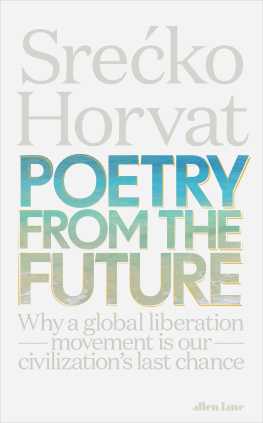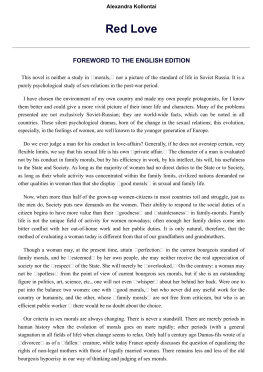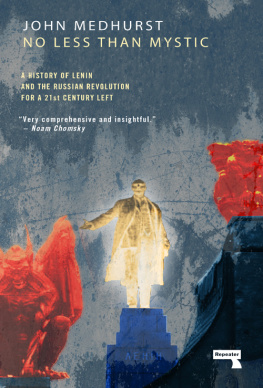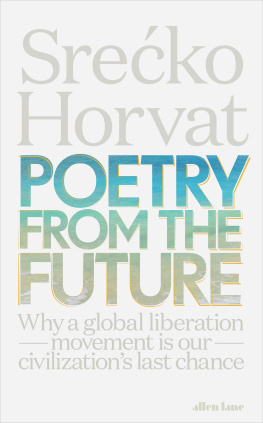Contents
- 1. Love in the Age of Cold Intimacies
Rimbauds reinvention of love Fuck bodies Nymphomaniac Grindr & Tinder Ideology of transparency Rimbaud again? - 2. Desire in Tehran: What Are the Iranians Dreaming Of?
The prohibition of desire Khomeinis Revolution Wet dreams of the regime Nineteen Eighty-Four Iranian nouveau riche H. The meaning of real freedom - 3. Libidinal Economy of the October Revolution
Sexual revolution Sexual counterrevolution Lenins troubles The prohibition of love Free love and careless kisses Appassionata or Revolution? - 4. The Temptation of Che Guevara: Love or Revolution?
Killing machine vs. Loving machine Che & Aleida Revolution based on love Communism for two Madness in love, reason in madness Renewed caress of bullets - 5. What Do I Care about Vietnam, if I Have Orgasm Problems?
The test of 68 Kommune 1 Rudi Dutschke vs. free love Das Wilde Leben The man as weapon Smash the monogamy! Lenin again?
Guide
Print Page Numbers

Theory Redux
Series editor: Laurent de Sutter
Published Titles
Roberto Esposito, Persons and Things Sreko Horvat, The Radicality of Love Dominic Pettman, Infinite Distraction
The Radicality of Love
Sreko Horvat
polity
Copyright Sreko Horvat 2016
The right of Sreko Horvat to be identified as Author of this Work has been asserted in accordance with the UK Copyright, Designs and Patents Act 1988.
First published in 2016 by Polity Press
Polity Press
65 Bridge Street
Cambridge CB2 1UR, UK
Polity Press
350 Main Street
Malden, MA 02148, USA
All rights reserved. Except for the quotation of short passages for the purpose of criticism and review, no part of this publication may be reproduced, stored in a retrieval system, or transmitted, in any form or by any means, electronic, mechanical, photocopying, recording or otherwise, without the prior permission of the publisher.
ISBN-13: 978-0-7456-9117-6
A catalogue record for this book is available from the British Library.
Library of Congress Cataloging-in-Publication Data
Horvat, Srecko.
The radicality of love / Srecko Horvat. pages cm
Includes bibliographical references.
ISBN 978-0-7456-9114-5 (hardback) -- ISBN 978-0-7456-9115-2 (pbk.) 1. Communism and love. 2. Communism and sex. 3. Love--Political aspects.
4. Radicalism. 5. Revolutions. I. Title.
HX550.L73H67 2015
128 . 46--dc23
2015014785
The publisher has used its best endeavours to ensure that the URLs for external websites referred to in this book are correct and active at the time of going to press. However, the publisher has no responsibility for the websites and can make no guarantee that a site will remain live or that the content is or will remain appropriate.
Every effort has been made to trace all copyright holders, but if any have been inadvertently overlooked the publisher will be pleased to include any necessary credits in any subsequent reprint or edition.
For further information on Polity, visit our website: politybooks.com
Foreplay: To Fall in Love, or Revolution
Each attempt to speak or even write about love is inevitably linked to a profound difficulty, to an anxiety: words are always insufficient. However, even if our attempt resembles a jump into dark water, we should dare to talk about love, with all the risks involved. We should try again, fail again, fail better. The necessity for this book is to be found in the following consideration: that the lovers discourse is still, like 40 years ago when Roland Barthes famously uttered this credo in his Fragments of a Lovers Discourse, of an extreme solitude.
It shouldnt surprise us so much that love is missing in the hypersexualized universe of the West, but what is striking is that it has no real place (does love have a place at all, or is it always already an a-topos?) or important role in recent upheavals all around the world, from Tahrir Square to Taksim, from Zuccotti Park to Puerta del Sol, from Hong Kong to Sarajevo. The question of love is surprisingly missing. It is hidden in the margins, whispered in tents, performed in a dark corner of the street. There are, of course, kisses on Taksim Square and passionate affairs in Zuccotti Park, but love is not the issue of serious debate. This book sadly aware that it is only a small step in a long journey in front of us; that it is maybe only a foreplay has to be seen as a risky contribution to this missing topic.
This attempt towards the possible meaning of radicality of love doesnt understand love in the vulgar materialistic sense of, lets say, the hippie explosion, or the sexual revolution of 68 that was, unfortunately, in the end primarily reduced to commodified desire, or the postmodern permissiveness where anything goes! It goes, or at least tries to reach, much beyond it, embarking from the following dock: it is not only enough to be true to your desire and ready to follow it until the end Lacans famous dictum: ne pas cder sur son desir (Do not give up on your desire); what is needed is a Duty to reinvent it from the very beginning each time over. Rimbauds famous credo that love has to be reinvented is the best recapitulation of this revolutionary duty.
It is wonderfully captured in one of the most beautiful instances of the fight against habit ever conducted, in Kierkegaards Works of Love:
Let the thunder of a hundred cannon remind you three times daily to resist the force of habit. Like that powerful Eastern emperor, keep a slave who reminds you daily keep hundreds. Have a friend who reminds you every time he sees you. Have a wife who, in love, reminds you early and late but be careful that all this also does not become a habit! For you can become accustomed to hearing the thunder of a hundred cannon so that you can sit at the table and hear the most trivial, insignificant things far more clearly than the thunder of the hundred cannon which you have become accustomed to hearing. And you can become so accustomed to having a hundred slaves remind you every day that you no longer hear, because through habit you have acquired the ear which hears and still does not hear.
The worst thing that can happen to love is habit. Love is if it is really love a form of eternal dynamism and at the same time fidelity to the first encounter. It is a tension, or better, a sort of dialectics: between dynamism (this constant re-invention) and fidelity (to this fatal and unexpected crack in the world). The same holds for Revolution. The moment when a revolution stops to reinvent, not only social and human relations, but stops reinventing its own presuppositions, we usually end up in a re-action, in a regression.
A truly revolutionary moment is like love; it is a crack in the world, in the usual running of things, in the dust that is layered all over in order to prevent anything New. It is a moment when air becomes thick and at the same time you can breathe more than ever. But remember Kierkegaard: when you get accustomed to hearing the thunder of a hundred cannon so that you can sit oblivious at the table, you know the revolution is at stake and the moment of counterrevolution lurks behind the thunder. The moment when you get used to the thunder of the hundred cannon, the truth of the event disappears. This is the reason why all these superficial classifications (Arab Spring, Occupy Movement, New Left, etc.), which evolved from the eternal drive of people to alienate things by definitions, are dangerously misleading and become untrue to the original event, or: a desire (not from the past, but) from the future.













